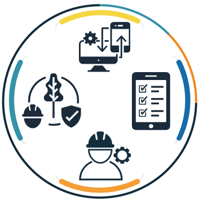4 min read
How New California Climate Law Could Impact Companies Worldwide
By: Ideagen DevonWay on February 13, 2024

A new law in California was recently passed that will require 5,000-plus companies that do business in the state to disclose their greenhouse gas emissions. The law only applies to companies operating within California – yet it’s predicted to have a sweeping impact across the globe, as so many of the largest companies in the world do business in the state.
The new California climate law is another step in global operations becoming more green – and the latest move toward all major companies being required to track and report on their greenhouse gas emissions.
An overview of the new California climate law
The new California climate law, the Climate Corporate Data Accountability Act, was signed in October 2023 by Gov. Gavin Newsom, marking significant steps in both the United States and globally when it comes to emissions reporting. The law, Senate Bill No. 253, will require U.S. companies that have an annual revenue of $1 billion or more to report their direct and indirect greenhouse gas emissions, beginning as soon as 2026.
Under the law, companies will need to annually submit full-scope Greenhouse Gas Protocol (GHG) emissions data reporting. These standards, which are globally recognized for greenhouse gas emissions reporting, categorizes emissions as Scope 1, 2 and 3:
- Scope 1 emissions are those created directly by an organization, through company-owned assets or controlled resources. These include emissions associated with running vehicles, boilers and furnaces, and factory fumes.
- Scope 2 emissions are created from the generation of energy that is purchased by the organization and typically include electricity, heat or steam.
- Scope 3 emissions account for all indirect emissions that occur in the value chain of an organization. While these are not directly controlled by the organization, its value chain indirectly leads to these outputs. For example, a clothing company must report on details such as the energy it takes for consumers to wash and dry their products.
While some organizations already voluntarily report this information, the new law makes it mandatory for qualifying companies to report, and it will capture their emissions information in a consistent way. In turn, consumers, investors and other stakeholders will have access to data that is both transparent and easily accessible, so they can fully understand the climate impact of a company.
How this might impact industries across the globe
For California, the new climate law is a step toward becoming a net-zero carbon economy. Yet it’s predicted the ramifications of these requirements will impact companies hoping to compete not only in the state but around the world.
California is home to some of the largest companies in operation, including Chevron, Disney and Apple, to name a few. Soon, these giants located within the state will need to break down and report the emissions output that occur as a result of their company.
Aside from the companies located within the state, any qualifying company that wants to do business in the state needs to comply as well. Considering California is the fifth-largest economy in the world (it would rank just behind Germany if it were a sovereign nation), companies will need to comply or miss out on its significant consumer base.
As the bill states: “United States companies that have access to California’s tremendously valuable consumer market by virtue of exercising their corporate franchise in the state also share responsibility for disclosing their contributions to global GHG emissions.”
California isn’t the first government to require climate disclosures, and many large organizations are already required to report elsewhere, such as in the European Union and the United Kingdom. Yet the state’s mandate is creating standards in the United States that many believe will ripple around the world.
“I believe California’s new rules represent a significant step toward mainstreaming corporate climate disclosures and potentially meaningful corporate climate actions,” said Lily Hsueh, professor of economics and public policy at Arizona State University.
“Subsidiaries of companies that didn’t have to report their emissions before will now be subject to disclosure requirements. California is in effect exercising its immense market leverage to establish climate disclosures as standard practice in the U.S. and beyond.”
What companies can do to prepare
The new California climate law will have implications throughout the world – and while large companies will need to comply first, climate disclosures are trending toward becoming standard for all businesses worldwide. If companies aren’t already tracking their GHG emissions, now is the time to get started.
Capturing this important data will not only support companies in meeting reporting requirements, but also give a clear understanding of their Environmental, Social, and Governance (ESG) initiatives to reach their sustainability goals. Measurements should be built into operations, with the ability to hone in or zoom out across operations, using metrics and KPIs to understand where the company is now and provide the insights on where and how to make changes to accelerate progress into the future.
How DevonWay can help
No matter where a company may be in its emissions reporting and ESG journey, DevonWay has the tools to bring it all together and meet the standards of tomorrow. With DevonWay’s ESG & Sustainability software, organizations can both track ESG metrics and implement performance initiatives to achieve goals. Leading standards are built-in to guide organizations through what they need to track, so they can measure, report and improve metrics with confidence.
Request a demo today to understand how we can support you in calculating your GHG emissions, and so much more.
Related Posts
Avoid ‘Greenwashing’ with ESG Accountability Support
You may have recently heard the term “greenwashing.” It’s a word no one wants their organization’s...
An Overview Of Scope 1, 2 and 3 Emissions And Why They Matter
As greenhouse gas emissions continue to rise, so too does the importance of understanding Scope 1,...
The Future of Reporting: An Overview of EU’s ESRS
On July 31, the European Commission adopted new sustainability reporting standards that will impact...





